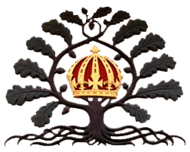Powellism
Powellism is the name given to the political views of Conservative and Ulster Unionist politician Enoch Powell. They derive from his High Tory and libertarian outlook.
| Part of the Politics series on |
| Toryism |
|---|
 |
|
Characteristics
|
According to the Oxford English Dictionary, the word Powellism was coined by The Economist on 17 July 1965. However, the day before, Iain Macleod had reviewed a book of Powell's speeches entitled A Nation Not Afraid in The Spectator in which he mentioned the word:
Enoch Powell has the finest mind in the House of Commons. The best trained and the most exciting. There is an attitude of mind which can be called "Powellism" and it is excellent that now we have the evidence collected in a book.[1]
The word was originally used to describe Powell's views on economics, and Powell offered his own definition: "[Powellism is] an almost unlimited faith in the ability of the people to get what they want through peace, capital, profit and a competitive market".[2]
Distinction from related philosophies
Differences with Thatcherism
The former Prime Minister, Margaret Thatcher, based many of her defining policies along the lines of Powell's rhetoric. However, while they shared between them a desire for the denationalization of industries, their methods of going about this were considerably different. Thatcher desired to severely limit the power of trade unions by defeating them in open industrial showdowns, most notably with the miners' strike showdown against the NUM, whereas Powell defended labour unions and desired to build unity with the working class by winning over trade unionists to monetarist policies through logic, intelligence and political arguments that were in opposition to socialist arguments. Furthermore, Thatcher's proposals to limit immigration were certainly not to the extent that Powell had proposed in 1968. While Thatcher intended to greatly reduce the power of the welfare state and national assistance, Powell had no enthusiasm for such methods and defended the welfare state.
The biggest schism of all between Powell and Thatcher, however, lies in foreign affairs. Powell's sentiment on Britain as part of the wider world would be more in line with Salisbury's "splendid isolation" than Thatcher's Atlanticism. Powell was a well-travelled man who spoke over a dozen languages, but his foreign policy of supporting Britain the nation state did not align with the stereotypical view some may hold of a man who was well-travelled and spoke so many languages. While Thatcher was a strong believer in the special relationship with the United States, Powell saw the United States as Britain's rivals, and not as allies.
Another foreign policy divide between Powell and Thatcher concerned their opinions and timings on the European Economic Community (EEC), as Thatcher was an enthusiastic supporter of Britain being members of the EEC in the 1970s and 1980s, including being one of the figureheads behind the victorious "Yes" campaign for Britain to stay in the EEC during the 1975 referendum, whereas Powell had been one of the figureheads of the losing "No" campaign to leave the EEC during the 1975 referendum. It was not until the late 1980s and into 1990 that Thatcher started expressing her increasing concern about the EEC's project to political and monetary union, whereas this was something that Powell had been warning about since the mid 1960s when he started openly opposing the EEC and the loss of British sovereignty that would result, showing Powell's stronger foresight into the matter.
Powell distanced himself philosophically from Thatcher. Notably, when it was remarked to him that she was a convert to Powellism, Powell replied: "A pity she never understood it!"
Divergence from libertarianism
Ralph Harris of the Institute of Economic Affairs wrote to Powell claiming that his views on immigration were antagonistic to the rest of his generally-libertarian views, but Powell disagreed with that notion.[28]
See also

Notes
- Andrew Roth, Enoch Powell: Tory Tribune (London: Macdonald, 1970), p. 328.
- W. H. Greenleaf, The British Political Tradition. Volume II: The Ideological Heritage (London: Methuen, 1983), p. 320.
- Simon Heffer, Like the Roman: The Life of Enoch Powell (London: Weidenfeld & Nicolson, 1999), p. 153.
- Heffer, p. 153.
- Heffer, p. 563.
- T. E. Utley, Enoch Powell: The Man and his Thinking (London: William Kimber, 1968), pp. 27-8.
- Powell, Enoch (16 November 1968). "Speech to London Rotary Club, Eastbourne". www.enochpowell.net. Retrieved 3 July 2018.
- Rex Collings (ed.), Reflections of a Statesman: The Writings and Speeches of Enoch Powell (London: Bellew, 1991), p. 393.
- Collings, p. 401.
- Collings, p. 390.
- Heffer, p. 450.
- Richard Ritchie (ed.), A Nation or No Nation? Six Years in British Politics (London: B. T. Batsford, 1978), p. 166.
- Roy Lewis, Enoch Powell: Principle in Politics (London: Cassell, 1979), p. 114.
- Lewis, p. 195.
- Lewis, p. 199.
- Collings, p. 487.
- Collings, pp. 487-8.
- Collings, p. 488.
- Collings, p. 263.
- Enoch Powell, The Common Market: Renegotiate or Come Out (London: Elliot Right Way Books, 1973), pp. 110-1.
- Collings, pp. 218-9.
- Heffer, p. 767.
- Mau Mau uprising: brutal history of Kenya conflict, BBC News, 7 April 2011
- Collings, p. 647.
- Collings, pp. 648-9.
- Collings, p. 649.
- Naim Attallah, Of a Certain Age (Quartet Books, 1993), p. 238.
- Heffer, p. 445.
Books on Powellism
- Rex Collings (ed.), Reflections of a Statesman: The Writings and Speeches of Enoch Powell (London: Bellew, 1991).
- Roy Lewis, Enoch Powell: Principle in Politics (London: Cassell, 1979).
- T. E. Utley, Enoch Powell: The Man and his Thinking (London: William Kimber, 1968).
- John Wood (ed.), A Nation Not Afraid: The Thinking of Enoch Powell (B. T. Batsford, 1965).